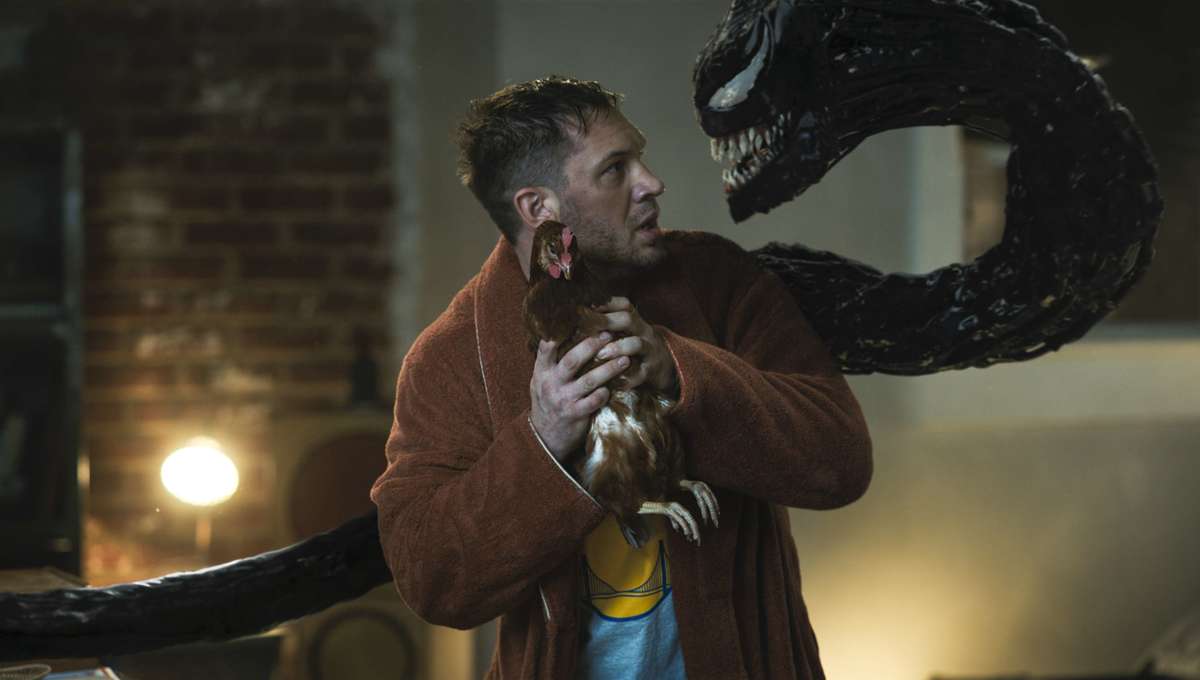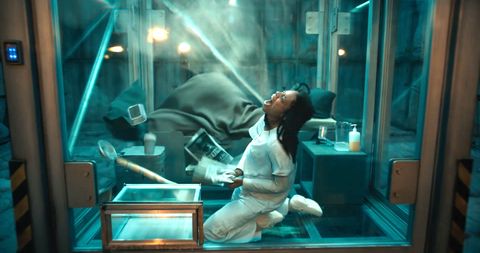I did not make the same mistake I made in 2018. Instead of waiting three years to watch it, I experienced Venom: Let There Be Carnage on the day it was released.
Sequels are hard. I call it second movie syndrome because most times a second installment fails to top its predecessor’s performance. 2018, with its charismatic villain and endearing Eddie Brock (Tom Hardy), made quite the impression and left big shoes for its sequel to fill.
Carnage mostly delivered. Spoilers below.

In the same way 2018 made subtextual criticisms at the corporate billionaires of the world who want to go to space, Carnage (kind of) made an attempt to call out the incarceration system. The main antagonists are imprisoned not just in their adult lives, but also in their youth as well.
It opens with Cletus (Woody Harrelson) and Frances (Naomie Harris) in a reform school. Cletus is trapped in a room, Frances cowering beside a toilet. He passes a ring made of rags through the pipes, and she puts it on her finger before they drag her away to be imprisoned with other people like her. She’s clearly terrified, and the narrative doesn’t reveal why she’s there, though viewers know that Cletus has murdered his family, or even why she loves Cletus. Unfortunately, Frances’s character development is regularly put aside in favor of Cletus’s.
As Frances is in the police van, she screams at an officer named Mulligan to escape. She fails. She’s shot, he’s half deaf, and she wakes up imprisoned in Ravencroft while Mulligan continues his life believing he killed her.
Eddie and Venom attempt to navigate their own relationship. Venom wants–needs–better nutrition, which involves killing people. Eddie doesn’t want to kill people. Venom wants to get back together with Anne and blames Eddie that it didn’t work out. Eddie wants to get back together with Anne, but respects that she’s with Dan.
Eventually Eddie and Venom break up. Venom abandons Eddie after a fight that trashes Eddie’s apartment and moves from host to host, eventually attending a party where he utters that he’s free of the Eddie closet.
Considering every major plot point revolves around a romance and/or wedding, the subtext regarding Venom’s and Eddie’s relationship is practically text at this point.
When Carnage manifests in Cletus, they escape their death sentence, rescue Frances from her own prison, and decide they’re going to take vengeance on three people: Eddie for Cletus, the police captain for Frances, and Venom for Carnage.
Eddie knows the only way they can defeat Carnage is for him to bond with Venom, and he works towards reuniting with him.
The climax of the plot occurs in a cathedral where Cletus intends to wed Frances. They fight. Eddie and Venom win the day with a new catch phrase (the Lethal Protectors, nicely foreshadowed with Venom crouching beside a stone gargoyle). They’re on the run. Stay after the artistic credits for a hint at what comes next, but don’t stay for the regular credits because there’s nothing at the end there.
The big emotional element I was hoping for was between Eddie and Venom. Carnage delivers.
Their relationship wreaks a little carnage of its own, not only physically in trashing the apartment, but between them as well. Venom moves from host to host, listless and searching. Eddie cleans his apartment, and though he doesn’t experience the drifting sensation that Venom does, ultimately has a moment where he acknowledges they bring out the best in each other. After Carnage is defeated, he buries Venom’s toes in the sand at a beautiful beach. They watch soap operas together.
In some ways though, the message gets lost in mixed signals. Eddie says “that’s abuse” after a moment where Venom is violent, and it foreshadows Venom wrecking his apartment shortly after they learn that Anne is marrying Dan. As someone who was abused, it’s hard to see that played for laughs on a personal level, but on a textual level, Cletus tells Eddie he never told the whole story–that Cletus, in fact, was abused by all three of the family members he murdered.
It’s also indicated that Eddie himself may have been abused as a child during an early encounter with Cletus where he taunts Eddie about his past.
I struggle with narratives that demonize abused children. Even though I agree abused children should not kill people (along with everyone else), I feel these types of stories tend to set up grades of victimhood: this is a good victim because they’re reacting the right way, but this is a bad victim because they’re not.
Again, I am not endorsing killing people as a valid method of healing from abuse, but treating it so casually lends itself to good and bad victims. If the narrative wanted to talk about abuse–and it seemed to want to with the undercurrent presence of it–I would have rather it focused on Eddie and Venom.
It bothers me that Venom didn’t have to apologize for trashing things that Eddie valued, or even for being physically violent with him.
The mixed signals don’t end there. The messages regarding incarceration fumbled its way through the narrative. Venom says the prison is an all you can eat buffet, but Eddie reminds him there are innocent people in the system. Venom declares his desire to freely live even as his presence (presumably) kills host bodies. I interpreted the scenes of the reform school in the beginning as heartbreaking and bleak, but both Cletus and Frances desire vengeance, second only to each other, and the narrative presents their final destruction as justice achieved.

Which brings us to Frances. She is a young Black child, already imprisoned. It is ignorant to ignore the reality of the high incarceration rates for Black people, including Black youths. She is manhandled by white cops into the car. She is fired upon by a white cop who believes he killed her. His violence against her is justified by her attacking with intent to kill, yet was she not just protecting herself from a system designed to say she does not–should not–exist?
She is imprisoned for her entire life until freed by Cletus. Her justified anger is literally villainized. Sexism collides with racism as Carnage repeatedly tells her to shut her mouth. It’s because her sonic abilities can kill Carnage, but it evokes sexism that every woman, especially women of color, know: do not speak. This becomes even more explicit in the narrative as Carnage silences her before she even screams, before she even barely draws a breath to speak.
It is at this moment that Cletus and Carnage become in conflict with each other, providing the visual foil for Eddie and Venom choosing each other. Yet, as Eddie and Venom work together, they come to the same conclusion as Frances — that it will take noise to truly destroy Carnage. And they push Frances off the tower so she screams, even though in every moment before this, she has screamed of her own free will.
She is ultimately silenced by death.

The narrative does the same thing the viewer is supposed to dislike Carnage for, but it’s okay this time, because she deserves it, because she wanted vengeance on the cop who shot her. Her justifiable anger is villainized and then punished by her death.
I even stayed to the very end of the credits to make sure that they weren’t going to bring Frances back because her death felt so wrong. I’m unsure of the significance of Mulligan’s glowy blue eyes at the end, and maybe it does have something to do with Shriek, but I’m not interested in anything other than Naomie Harris continuing to play Frances.
Venom eats both Carnage and Cletus at the end. Cletus confesses he wanted Eddie to be his friend (for some reason), even though it’s played off as manipulative. But being abused is lonely. Being in prison is lonely. Rehabilitation can be difficult to impossible depending on someone’s circumstances.
The music that played on the trailer was about the loneliest number. Loneliness threads its way through this narrative. Both Cletus and Frances are regularly depicted alone in their cells. Cletus’s dying words are about his loneliness. Frances dies alone.
In contrast, Eddie and Venom are alone with each other until they come to an understanding. Even though Anne is marrying Dan, Eddie can still call her–she is part of his support network. This is clearly visualized in the final moments of the penultimate conflict. Venom, in his goo form, drifts through Dan, then Anne, and finally back into Eddie again moments before he would have fallen to his death.
Teamwork saves the day in more ways than one, but it’s something that both Cletus and Frances are inhibited from accessing.
Since I haven’t read the comic books, I can’t say whether or not Carnage is a good adaptation, but I can say that when I read the wiki articles for Shriek, I really hoped Carnage would do better by her. I don’t believe it did. Is Venom: Let There Be Carnage worth watching? I think so, but how good it could have been will make the bad parts even more disappointing.
